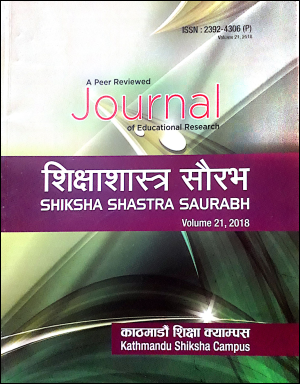Public Financing in Higher Education Institutions: Issues and Challenges
DOI:
https://doi.org/10.3126/sss.v21i0.35072Keywords:
Goods, Revenue, Equity, Efficiency, Accountability, Relevancy, Quality, Cost-recoveryAbstract
This paper is an attempt to analyze the present pattern of funding higher education in Nepal and to discuss the desirability and feasibility of various alternative methods of funding the same. Before federal system, higher education (HE) in Nepal was a state funded but currently the paradigm has been shifted to the province government besides the funding of central university, which has not been well-defined. Higher education itself benefits not only society at large, but also individuals, and as it attracts relatively more privileged sections of the society, there is a rational for shifting the financial burden to the social domain rather to government sector alone.
The main objective is to review the current policies, practices of financing in promoting access, quality, relevancy, equity and prosperity. On the basis of secondary sources of data this paper focused the reports published by University Grants Commission, Nepal (UGC). Some other relevant literature, reports, articles, books, policy documents were critically analyzed and reviewed to draw the findings and conclusion. Some statistical methods were used for interpretation.
Resource constraints, equity, financing HE mostly from the general tax revenue may not be a desirable policy in the long run. Accordingly some of the alternative policy choices are discussed for financing HE from the public exchequer, student loans, student fees, and the role of the community investment. Among the available alternatives, it is argued that a discriminatory pricing mechanism and subsidy policies to community campuses of different layers of government would be relatively more efficient and equitable mechanism of financing as community campuses are providing the major access, equity, quality as well and reducing the financial burden of government with the cost recovery modality.
It is argued that such institutions should be the priority of government for promoting equitable quality access to HE with nominal costs of users.
Downloads
Downloads
Published
How to Cite
Issue
Section
License
© Research Management Cell (RMC), Kathmandu Shiksha Campus

